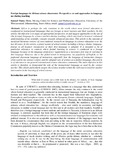| dc.contributor.author | Oyoo, Samuel Ouma | |
| dc.date.accessioned | 2013-11-29T10:04:57Z | |
| dc.date.available | 2013-11-29T10:04:57Z | |
| dc.date.issued | 2011 | |
| dc.identifier.citation | Samuel Ouma Oyoo , Marang Centre for Science and Mathematics Education, University of the Witwatersrand, Johannesburg, South Africa; email: samuel.oyoo@wits.ac.za | en |
| dc.identifier.uri | http://www.deta.up.ac.za/archive2011/papers_presentations/Oyoo%202011DETA%20PAPER_DrSamuelOumaOyoo_paper.pdf | |
| dc.identifier.uri | http://hdl.handle.net/11295/61114 | |
| dc.description.abstract | Africa is perhaps the only continent in th
e world where most formal education is
conducted in instructional languages
that are foreign to most learne
rs and their teachers. In this
article, the objective is to ar
gue an appropriate perspective on and suggest approaches to the use of
(the foreign) language by science teachers during
teaching, which may lead to learners’ enhanced
understanding of the scientific concepts towards enhan
ced outcomes. This article is the outcome of
sustained literature reviews of
cross-national research on language
in science education over the
last 40 years. In this article, a plural nature of
school science including it
being a distinct language,
foreign to all learners irrespect
ive of their first language is adopt
ed. It is intended to be of
particular relevance to contexts where formal learning in science is conducted in a foreign
language because of the language proficiency requireme
nt as a necessary first step in learning in
that language. However, due to the global trends in
immigration, the popularit
y of English, as the
preferred classroom language of
instruction, especially how th
e language of instruction changes
when used in the science context, and the adopted view
of science as a distinct language, this article
is of relevance to the general in
ternational science education comm
unity. The main objective in this
article is therefore to foreground the role of th
e instructional language as used by the science
teacher. This article particularly targets the scie
nce teacher within the we
ll known need for teacher
intervention in the lear
ning of school science. | en |
| dc.language.iso | en | en |
| dc.publisher | University of Nairobi | en |
| dc.title | Foreign languages in African science classrooms : Perspectives on and approaches to language use during teaching | en |
| dc.type | Presentation | en |
| local.publisher | Centre for Open and Distance Learning | en |

